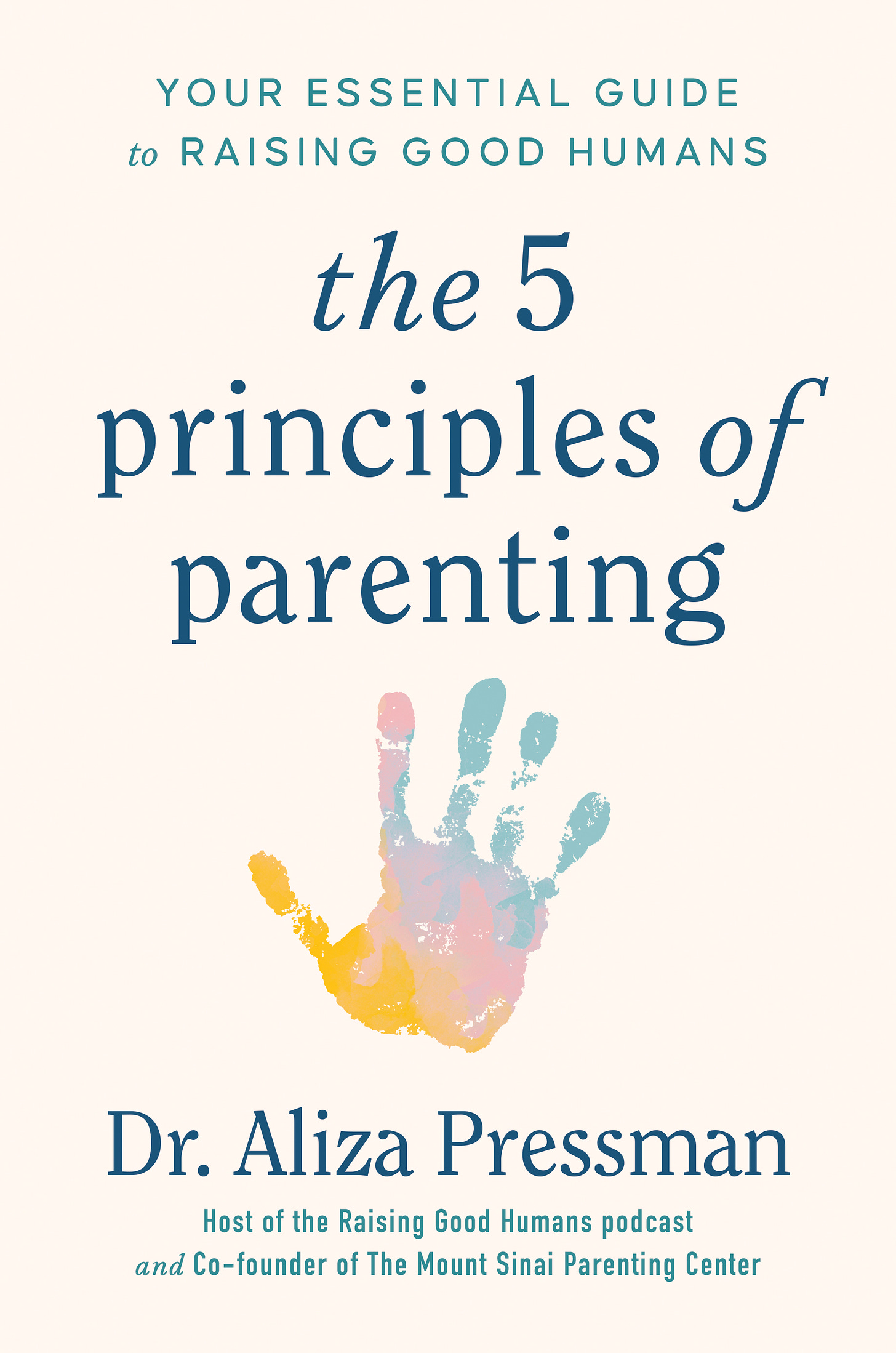It’s time (again) to talk about teen drinking
Myths and tips around supporting our young people
Thanks for reading Raising Good Humans on Substack! My first book, The Five Principles of Parenting: Your Essential Guide to Raising Good Humans is now available for purchase here.

In this week’s episode of the Raising Good Humans Podcast, I am bringing back an episode on teen drinking with Professor Rob Turrisi. I wanted to have this conversation with him because he talks about all the evidence that we have in behavioral decision making and substance misuse prevention, and how we can use that to inform our decisions about how to support our kids around teen drinking. He has decades of research that he shares insights on, and talks about developmental factors influencing alcohol use among adolescents and emerging adults in the transition from high school to college. I wanted to share it with you because this is the time of year when the summer, the celebrations, and new freedom comes with new decisions and discussions we need to have around our youth around drinking.
I’m also reposting key takeaways from the episode below.
I hope you will learn from them - even if it feels early and you have young children - and I hope they will empower you with information you need to support your family.
Let’s start with some myth busting
Myth #1: Alcohol disorders are not a major concern for young people
Fact #1: The number of college students who have an alcohol disorder exceeds the population of some major US cities.
Many parents overlook the dangers facing young people around alcohol. Whether it is our attempt to be friends with our child, to be “cool,” or our own behavior and thinking around alcohol norms, many parents do not take the issue of alcohol misuse seriously in young people. We are more likely to minimize alcohol experimentation, to assume that our children are capable of handling routine peer pressure, and to place undue faith on them learning lessons from their own behavior (more on that below). Instead, Professor Turrisi’s research shows us that a lot of college drinking is essentially OUT OF HAND for many of our young people, and that starting early with conversations and monitoring in adolescence is an important step in delaying and reducing eventual alcohol misuse.
Myth #2: Early moderate drinking experience is protective of future binge drinking
Fact #2: Exposure to alcohol in High School does NOT help to prevent misuse in college.
This myth is prevalent in our society. We have the notion that if kids learn to drink in moderation while living with us and under our supervision, they will be better off in college when they have increased independence. However, the data has NEVER shown this to be true. Research from around the world fails to show any benefit to starting to drink earlier, but instead shows that early drinkers go on to drink more later in their lives, and are more likely to experience the harsh consequences of alcohol abuse. Professor Turrisi’s research shows that when parents let their kids drink at an early age, those kids are actually more likely to show signs and symptoms of alcohol-use disorder as young as 19 or 20. It also shows that whatever a student's high watermark is in the fall semester of their first year, stays that way through four years of college. This suggests that unless we do something to disrupt the pattern, it is not likely to change.
Myth #3: Blackouts are pass outs
Fact #3: Blackouts are a sign the body is shifting resources.
When we think about blackouts, we often picture a student passed out at the table at a party, or perhaps asleep on the floor of their dorm room. In fact, during blackouts the person is “awake,” and may even appear totally alert, but their brain has shifted resources so that they are no longer forming memories. The brain is working so hard on breathing and heart rate, focused on survival, and therefore shutting off the function of memory. Though this is a terrifying description, it is an important explanation to have at the ready to discuss with your adolescents
Myth #4: Kids are learning from negative experiences with alcohol
Fact #4: The average kid walking around a college campus has an average of 100 negative consequences of social drinking.
While many of us (myself included) believe in the concept of natural consequences - those that come as a result of our child’s choices that help them to learn how to adjust in the future - when it comes to consequences resulting from alcohol use, the numbers are staggering. If the average college student is having 100 negative consequences, the stakes are already too high. As such, we have to shift our thinking around learning through experience, and instead work to prevent some of the consequences earlier on. This correlates to what parents can do (see that article coming soon) to influence the outcomes while our children are still under our care.
Myth #5: They do things right in Europe
Fact #5: Things are not better in Europe.
We have all heard the comparisons of US drinking to the ideal setting in Europe. We love to watch children drinking fine wine in France, and think that they have figured out something we haven’t. Research shows that this just simply is not true. European drinking starts earlier than in the US (with the notable exception of Turkey, a Muslim country), and results in a higher number of young people with alcohol disorders. There is no magic happening in Europe, and parents’ attitudes towards early drinking (and a lower drinking age) does NOT appear at all protective in the data.
And now, 5 things we can do as parents that are associated with healthier outcomes
Positive communication practices
This is TOUGH for us to do with our teenagers. Instead of always focusing on the negative, and telling them what not to do, we need to create a culture of positive communication. I always urge parents to remember that there is more we can do with open conversation and listening, than with our best logic and lessons. Instead of focusing on conversations that are scary and punitive, focus on curiosity. Ask your child about what they are thinking and feeling - instead of assuming they are going to mess up. Focus on seeing the situation from their perspective and creating an environment of positive communication practices.
A strong relationship
Science tells us that a strong parent-child relationship is one of the single most important factors in our child’s overall well-being. That’s why relationships are one of my 5 Principles of Parenting. Therefore, it’s no surprise that a strong relationship with trust between you and your child, unconditional love, and genuine connection provides for healthier outcomes around drinking. If our children know that they can come to us, we have the opportunity to make meaningful change and provide important guidance in hard moments. If we have close connected relationships, then our kids will know that if they make a mistake, they can come to us.
Modeling behavior
We are the most consistent role models for our children. That’s not to say we can never drink or serve alcohol in our home, but only that we need to consider the habits we are modeling regularly, how and why we are drinking, and what messages we are sending. Take a moment to think if your habits are healthy. How much and how often do you drink? Do you drive after drinking and brush it off? Talk about feeling hungover or drinking too much? Or do you simply model celebrating every occasion with a drink, or giving your kids small sips at special times? Consider what alcohol use looks like in the culture of your family, from your child’s perspective, and make whatever changes you think may promote healthier habits for them.
High Quality Monitoring
The point of monitoring behavior is to be aware of, and in touch with, your child’s behavior, whereabouts and friends. It is NOT about catching your children in a lie, overstepping boundaries, or suffocating your kids. High quality monitoring isn’t intended to embarrass your children or undermine trust, but instead to be able to offer guidance around choices your child is facing. Professor Turrisi suggests that we start this monitoring early for our children, routinely getting to know other parents, asking questions of our child and their friends, and offering help as a means of keeping tabs on events. For example, Professor Turrisi likes saying, “Are there going to be adults at the party? Can you leave a cell number for me so I can ask them if they need any help?” as a way of suggesting that your child learn how adults show up for each other.
Rules in your home
You know how I feel about rules (another one of my 5 principles!) Setting clear, consistent and appropriate boundaries and limits is an important parent responsibility, especially around substances. We cannot shirk away from this responsibility just because we know they are going to make mistakes around drinking, and our fear does not mean we need to change the rules to accommodate them. We have to communicate clear expectations while still expecting them to make mistakes, as they grow into the young people they will become. It is a tricky balance, but it is possible.
A quick reminder to buy my first book, The Five Principles of Parenting, and write a review from wherever you order. Reviews really help to get the book noticed, and to spread the word. Please especially rate and review any books purchased on Amazon (it shockingly really, really matters!). Also, when you receive the book, snap a quick pic with it and post on social media. Share one thing you love about it and help me to get more copies into the hands of parents in your community. Tell a friend about the book, or about something you found helpful in the book. Parents look to each other for advice, and I’d love to be a part of the support you pass on to your loved ones.





